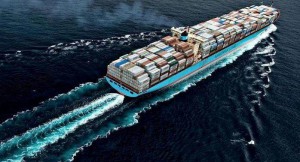A coalition of government, non-profit and marine industry groups have announced the launch of a new trial incentive program to slow ships down in the Santa Barbara Channel in an effort to reduce air pollution and increase protection of endangered whales. 
Six global shipping companies, Maersk Line, COSCO, Hapag Lloyd, K Line, Matson, and United Arab Shipping Company are participating in the speed reduction incentive program from July through October. Selected ships in their fleets will reduce their speed to 12 knots or less (reduced from typical speeds of 14-18 knots) as they travel between Point Conception and the Ports of Los Angeles and Long Beach. Each company will receive $2,500 per participating vessel passing through the Santa Barbara Channel.
Ship strikes are a threat to recovering endangered whale populations. The ships also emit greenhouse gases and air pollutants, and account for more than 50 percent of ozone-forming nitrogen oxides in Santa Barbara County.
“Few people realize that ships off our coast, especially those moving at faster speeds, are a risk to endangered whales and the quality of the air we breathe,” said Kristi Birney of the Environmental Defense Center.
“Reducing ship speeds to 12 knots or less reduces emissions of smog-forming air pollutants that harm our health,” said Dave Van Mullem, director, Santa Barbara County Air Pollution Control District. “We are pleased to be part of this partnership to achieve common goals, and excited about the potential for improving air quality in our county.”
“Slowing ships down reduces the likelihood that a ship strike on a whale will be fatal,” said Chris Mobley, superintendent, Channel Islands National Marine Sanctuary. “We are extremely pleased with the positive response from the shipping industry to test non-regulatory, innovative approaches to protect human health and the marine environment while maintaining vibrant maritime commerce.”
The program has funding to support 16 transits and the initial response has been extremely positive. The coalition received more than 25 ship transit requests to be included in the trial and is seeking additional funding to expand the trial.
Maersk Line representative, Dr. Lee Kindberg, Director, Environment & Sustainability, North America, added, “The Santa Barbara Channel program is a logical extension of our other environmental initiatives. We appreciate this opportunity to help demonstrate the environmental and operational impacts of speed reductions in sensitive areas.”
The vessel speed program is supported by local and national foundations. The National Marine Sanctuary Foundation will manage the incentive payments with funding from the Santa Barbara Foundation and the Santa Barbara County Air Pollution Control District. Payments will be provided upon verification of the ships’ speeds through the Channel, using Automatic Identification System monitors that receive speed and location data from the transponders on ships as they transit.
Read more: Maersk
